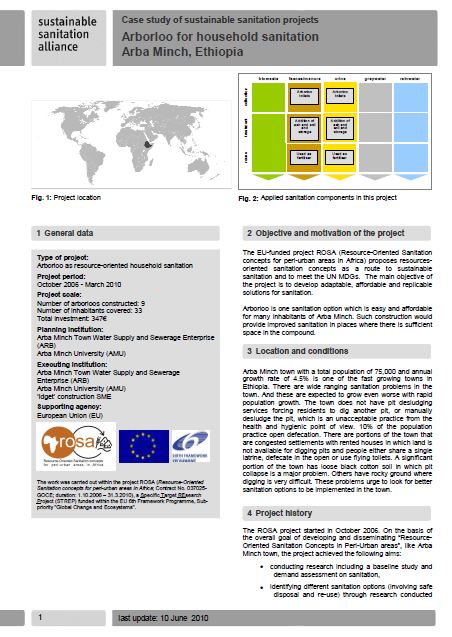Arborloo for household sanitation, Arba Minch, Ethiopia - Case study of sustainable sanitation projects
Shewa, W., Geleta, B. (2010)

Published in: 2010
Publisher:
Sustainable Sanitation Alliance (SuSanA)
Author:
Shewa, W., Geleta, B.
Uploaded by:
SuSanA secretariat
Partner profile:
common upload
12912 Views
275 Downloads
Location of library entry
Content - Summary
This case study is about the implementation of 9 Arborloo reaching 33 beneficiaries in Arba Minch/Ethiopia. The project been realized within the ROSA (Resource-Oriented Sanitation concepts for peri-urban areas in Africa) project which aims to develop adaptable, affordable and replicable sanitation solutions in Africa.
Since its inception in October 2006, the ROSA project has introduced different resource oriented sanitation systems that include three types of toilets, greywater treatment unit, biogas unit and composting schemes. At the moment there are 15 urine-diversion dry toilets (UDDT), 30 Fossa alternas, 9 Arborloos, 9 greywater towers, 1 biogas unit and more than 5 composting schemes. In this case study Arborloos are focused.
Arborloo is one sanitation option which is easy and affordable for many inhabitants of Arba Minch. Such construction would provide improved sanitation in places where there is sufficient space in the compound. The operation and maintenance of the Arborloo toilets is simple and can be carried out by the user. When the Arborloo pit is full, the superstructure parts of the toilet are moved to another place, where a pit needs to be dug and used in the same way again. A thick layer of soil (min. 0.4m) is placed over the filled pit. A young tree is planted in this soil and is watered and cared for. The household may only pay for a daily labourer to dig the new pit and move the slab and the shelter.
The nutrients from the urine and faecal matter are directly used by the plants which are grown on the filled arborloo pit. The absence of credit facilities for households which are interested to construct the demonstrated innovative toilet option has constrained efforts for further up-scaling of the implementation.
The planning institutions are: Arba Minch Town Water Supply and Sewerage Enterprise (ARB) and Arba Minch University (AMU). The executing institutions are Arba Minch Town Water Supply and Sewerage Enterprise (ARB), Arba Minch University (AMU) and ‘Idget’ construction SME.
Bibliographic information
Shewa, W., Geleta, B. (2010). Arborloo for household sanitation, Arba Minch, Ethiopia - Case study of sustainable sanitation projects. Sustainable Sanitation Alliance (SuSanA)
Filter tags
Case studies in SuSanA template Composting, vermicomposting (solid waste), composting toilets English Faeces or faecal sludge Peri-urban Sub-Saharan Africa














